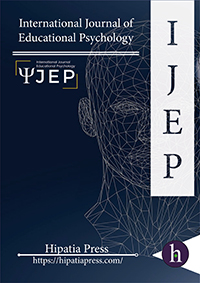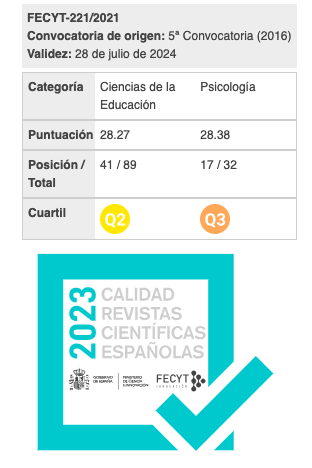The Value of Pedagogical Preferences: A Case of Personality and Learning Environments in Higher Education
Keywords:
Downloads
Abstract
To improve learning outcomes, research evidence has accumulated regarding the principles of teaching and learning; however, students’ perceptions of teaching methods have received little scientific investigation toward enhanced quality of their learning. To provide a demonstration of the value of researching student perceptions of the learning environments in which they find themselves, a sample of preference ratings (n = 69) was examined to test the hypothesis there exist among the Five Factor personality dimensions correlates of preference ratings for three environments: teacher-led, independent-autonomous, and groups. Results confirmed preference for group learning in our sample and statistically reliable zero-order positive correlations between group-based learning preference and both extraversion and openness scores and between preference for teacher-led environments and openness scores. First-order correlations showed no significant changes in accounted preference variation when controlling the other personality factors scores. These findings are discussed with respect to likely social-cognitive and neurodevelopmental bases of group learning effectiveness and the utility of investigating student preferences for improving the quality of learning.
Downloads
References
Ashman, A. F., & Gillies, R. (2003). Cooperative learning: The social and intellectual outcomes of learning in groups. London: Routledge.
Google Scholar CrossrefAusubel, D. P. (1968). Educational psychology: A cognitive view. New York: Holt Rhinehart and Winston.
Google Scholar CrossrefBiggs, J. B. (1987). Study process questionnaire manual. Hawthorn, Vic: Australian Council for Educational Research.
Google Scholar CrossrefBiggs, J. B., Kember, D., & Leung, D. Y. P. (2001). The revised two-factor Study Process Questionnaire: R-SPQ-2F. British Journal of Educational Psychology, 71, 133-149.
Google Scholar CrossrefBiggs, J. B., & Tang, C. (2011). Teaching for quality learning at university (4th ed.). Berkshire: Open University Press.
Google Scholar CrossrefBlakemore, S.-J., & Robbins, T. W. (2012). Decision-making in the adolescent brain. Nature Neuroscience, 15(9), 1184-1191.
Google Scholar CrossrefChamorro-Premuzic, T., Furnham, A., Dissout, G., & Heaven. P. (2005). Personality and preference for academic assessment: A study with Australian university students. Learning and Individual Differences, 15, 247-256.
Google Scholar CrossrefChamorro-Premuzic, T., Furnham, A., & Lewis, M. (2007). Personality and approaches to learning predict preferences for different teaching methods. Learning and Individual Differences, 17, 241-250.
Google Scholar CrossrefChoudhury, S., Charman, T., & Blakemore, S. J. (2008). Development of the teenage brain. Mind, Brain, & Education, 2(3), 142– 147.
Google Scholar CrossrefCosta, M. L. Ransberg, L. V., & Rushton, N. (2007). Does teaching style matter? A randomized trial of group discussion versus lectures in orthopaedic undergraduate teaching. Medical Education, 41, 214-217. doi: 10.1111-j.1365-2929.2006.02677.x
Google Scholar CrossrefCosta, P. T., Jr., & McCrae, R. (1992) Revised NEO Personality Inventory (NEO-PI-R) and NEO Five-factor Inventory (NEO-FFI): Professional manual. Odessa, FL: Psychological Assessment Resources Inc.
Google Scholar CrossrefCurry, L. (1983). An organisation of learning styles theory and constructs. Paper presented at the annual meeting of the American Educational Research Association, Quebec.
Google Scholar CrossrefCurry, L. (1990). One critique of the research on learning styles. Educational Leadership, 48, 50-56.
Google Scholar CrossrefDuff, A., Boyle, E., & Dunleavy, K., & Ferguson, J. (2004). The relationship between personality, approach to learning, and academic performance. Personality and Individual Differences, 36, 1907-1920.
Google Scholar CrossrefDunn, R., Dunn, K., & Price, G. (1989). Learning style inventory. Lawrence, Kansas: Price Systems.
Google Scholar CrossrefEntwistle, N. (2019). Contributions of educational psychology to understanding student learning: What has been discovered – what more could be done? The Psychology of Education Review, 43(1), 9-19.
Google Scholar CrossrefEysenck, H. J. (1992). Four ways five factors are not basic. Personality and Individual Differences, 13(6), 667–673.
Google Scholar CrossrefFelder, R. M. (1993). Reaching the Second Tier: Learning and Teaching Styles in College Science Education, Journal of College Science Teaching, 23(5), 286-290.
Google Scholar CrossrefFelder, R. M., & Spurlin, J. E. (2005). Applications, Reliability, and Validity of the Index of Learning Styles, International Journal of Engineering Education, 21, 103-112.
Google Scholar CrossrefFraser, B. J. (2014). Classroom learning environments: Historical and contemporary perspectives. In N. G. Lederman & S. K. Abell (Eds.), Handbook of research on science education (Vol. II, pp. 104–117). New York: Routledge.
Google Scholar CrossrefFrey, N., Fisher, D., & Everlove, S. (2009). Productive group work: How to engage students, build teamwork, and promote understanding. Alexandria, Virginia: Association for Supervision & Curriculum Development.
Google Scholar CrossrefFriedman, P., & Alley, R. (1984). Learning/teaching styles: Applying the principles. Theory into Practice, 77, 77-81.
Google Scholar CrossrefFurnham, A. (1992). Personality and learning style: A study of three instruments. Personality and Individual Differences, 13, 429-438.
Google Scholar CrossrefFurnham, A. (2011). Personality and approaches to learning. In T. Chamorro-Premuzic, S. von Stumm, & A. Furnham (Eds.), The Wiley-Blackwell Handbook of Individual Differences (pp. 588-607). Chichester: Wiley.
Google Scholar CrossrefGardner, M. & Steinberg, L. (2005). Peer influence on risk taking, risk preference, and risky decision making in adolescence and adulthood: an experimental study. Developmental Psychology, 41, 625–635.
Google Scholar CrossrefHalpern, D. F., & Hakel, M. D. (2003). Applying the Science of Learning to the University and Beyond, teaching for Long-term Retention and Transfer. Change, 37, 37-41.
Google Scholar CrossrefHoney, P., & Mumford, A. (1992). The manual of learning styles. Berkshire, England: Honey, Ardingly House.
Google Scholar CrossrefHorak, V. M., & Horak, W. J. (1982). The influence of student locus of control and teaching method on mathematics achievement. Journal of Experimental Education, 51, 18-21.
Google Scholar CrossrefHouse, J. D. (2005). Classroom instruction and science achievement in Japan, Hong Kong, and Chinese Taipei: Results from the TIMSS 1999 assessment. International Journal of Instructional Media, 32(3), 295– 311.
Google Scholar CrossrefHulley, S. B., Cummings, S. R., Browner, W. S., Grady, D., & Newman, T. B. (2013). Designing clinical research: an epidemiologic approach (4th ed.). Philadelphia: Lippincott Williams & Wilkins.
Google Scholar CrossrefJackson, C., & Lawtey-Jones, M. (1996) Explaining the overlap between personality and learning styles. Personality and Individual Differences, 20(3), 293-300.
Google Scholar CrossrefJensen, J. L., Holt, E. A., Sowards, J. B., Ogden, T. H., & West, R. E. (2018). Investigating strategies for pre-class content learning in a flipped classroom, Journal of Science Education and Technology, 27, 523-535.
Google Scholar CrossrefJohnson, D. W., & Johnson, R. T. (2009). An educational psychology success story: Social interdependence theory and cooperative learning. Educational Researcher, 38(5), 365-379.
Google Scholar CrossrefJohnson, D. W., Johnson, E. J., & Holubec, E. J. (2008). Cooperation in the classroom (2nd ed.). Edina: Interaction Book Company.
Google Scholar CrossrefKhine, M. S., Fraser, B. J., Afari, E., Oo, Z., & Kyaw, T. T. (2017). Students’ perceptions of the learning environment in tertiary science classrooms in Myanmar. Learning Environments Research, 21, 135-152. doi: 10.1007/s10984-017-9250-0
Google Scholar CrossrefKolb, D. A. (1984). Experiential learning. Englewood Cliffs, New Jersey: Prentice-Hall.
Google Scholar CrossrefLake, W., Boyd, W., & Boyd, W. (2017). Understanding how students study: The genealogy and conceptual basis of a widely used pedagogical research tool, Biggs’ study process questionnaire. International Education Studies, 10(5), 100-108. doi:10.5539/ies.v10n5p100
Google Scholar CrossrefLaw, Y. (2008). Effects of cooperative learning on second graders’ learning from text. Educational Psychology, 28(5), 567– 582.
Google Scholar CrossrefLeDoux, J. E. (2002). The synaptic self: How our brains become who we are. New York: Viking.
Google Scholar CrossrefMarton, F. (2015). The necessary conditions of learning. London: Routledge.
Google Scholar CrossrefMatthews, D. B., & Jones, M. C. (1994). An investigation of the learning styles of students in teacher education programs. Journal of Instructional Psychology, 21, 234-246.
Google Scholar CrossrefMatthews, G., Dreary, I. J., & Whiteman, M. C. (2003). Personality traits (2nd ed.). Cambridge: Cambridge University Press.
Google Scholar CrossrefMcCrae, R. R., Kurtz, J. E., Yamagata, S., & Terracciano, A. (2010). Internal consistency, retest reliability and their implications for personality scale validity. Personality and Social Psychology Review, 15(1), 28-50.
Google Scholar CrossrefMurphy, R. J., Gray, S. A., Straja, S. R., & Bogert, M. C. (2004). Student learning preferences and teaching implications. Journal of Dental Education, 68(8) 859-866.
Google Scholar CrossrefNokes-Malach, T. J., Richey, E., & Gadgil, S. (2015). When is it better to learn together? Insight from research on collaborative learning. Educational Psychology Review, 27, 645-656.
Google Scholar CrossrefÖhrstedt, M., & Scheja, M. (2018). Targeting efficient studying – first semester psychology students’ experiences. Educational Research, 60(1), 80-96.
Google Scholar CrossrefParent, J., Forward, J., Cantor, R., & Mohling, J. (1975). Interactive teaching effects of learning style and personal locus of control on student performance and satisfaction. Journal of Educational Psychology, 67, 764-769.
Google Scholar CrossrefPashler, H., McDaniel, M., Rohrer, D., & Bjork, R. (2008). Learning styles: Concepts and evidence. Psychological Science in the Public Interest, 9, 105-119.
Google Scholar CrossrefPiaget, J. (1970). Science of education and the psychology of the child. D. Coltman (trans). Oxford, England: Orion.
Google Scholar CrossrefRiener, C., & Willingham, D. (2010). The myth of learning styles. Change, 42(5), 32-35.
Google Scholar CrossrefSkinner, E., & Furrer, C., & Marchand, G., & Kindermann, T. (2008). Engagement and disaffection in the classroom: Part of a larger motivational dynamic? Journal of Educational Psychology, 100(4), 765-781.
Google Scholar CrossrefStander, J., Grimmer, K., & Brink, Y. (2019). Learning styles of physiotherapists: A systematic scoping review. BMC Medical Education, 19(1), 2-10. doi:10.1186/s12909-018-1434-5
Google Scholar CrossrefSternberg, R. J., Grigorenko, E. L., & Zhang, L. (2008). Styles of learning and thinking matter in instruction and assessment. Perspectives on Psychological Science, 3, 486-506.
Google Scholar CrossrefSwanberg, A. B., & Martinsen, O. L. (2010). Personality, approaches to learning and achievement. Educational Psychology, 30(1), 75-88.
Google Scholar CrossrefVermette, P. J., & Kline, C. L. (2017). Group work that works: Student Collaboration for 21st Century Success. London: Routledge.
Google Scholar CrossrefVygotsky, L. S. (1978). Mind in society: The development of higher psychological processes. Cambridge, MA: Harvard University Press.
Google Scholar CrossrefWise, R.A. (2004). Dopamine, learning and motivation. Nature Reviews Neuroscience, 5, 483–494.
Google Scholar CrossrefZhang, L. F. (2002). Thinking styles and the Big Five Personality Traits. Educational Psychology, 22(1), 17-31.
Google Scholar CrossrefDownloads
Published
Almetric
Dimensions
How to Cite
Issue
Section
License
All articles are published under Creative Commons copyright (CC BY). Authors hold the copyright and retain publishing rights without restrictions, but authors allow anyone to download, reuse, reprint, modify, distribute, and/or copy articles as the original source is cited.
















